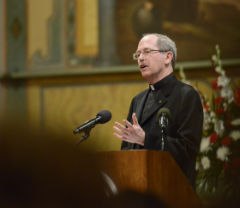
President Michael Engh, S.J., Delivers State of the University Address
SANTA CLARA, Calif., Feb. 12, 2013— In his annual State of the University address, Santa Clara University President Michael Engh, S.J., described a number of initiatives being explored to help the University “grow and adapt Santa Clara's educational mission in order to keep it a living, vibrant, and contemporary tradition.”
Speaking before a packed audience at the Mission Church, Engh described several pilot initiatives SCU is undertaking to increase the use of technology for teaching, while maintaining SCU’s student-centric teaching method and practices. Such initiatives will help SCU cope with a number of headwinds, from state-budget cuts to nationwide inflation in education costs, he said.
“We are innovating to provide the best instruction possible to our students, as well as to engage our faculty in the latest developments in instructional technology,” he said.
Several of the initiatives involve online or technology-enhanced educational options. Those include a “collaborative classroom” project; a mobile-technology project, and online courses that are currently being developed in the Graduate Program in Pastoral Ministry; Education and Counseling Psychology; engineering and the Executive Development Center of the Leavey School of Business.
In addition, the University’s first “MOOC” – or massive, open, online course — focused on business ethics will launch shortly out of the Markkula Center for Applied Ethics.
“By cultivating an array of high-impact learning experiences for our students, we prepare them with the skills and the desire to help fashion a more humane, just, and sustainable world,” said Engh.
He also listed several successful construction projects completed or begun in recent months: dedication of the Schott Admissions and Enrollment Services Building; opening of Graham residence hall; initiation of construction on a new parking garage, and completion of the first phase of the softball stadium.
The University also has updated its wireless network, including moving to Google Apps for Education and its many collaboration tools; initiated a Bronco Leadership initiative for 50 student athletes to create a culture of winning and sportsmanship, and increased crisis-protection measures.
He also mentioned SCU’s participation in and contribution to a nationwide study of the treatment of undocumented students, the results of which will be presented in Washington, D.C., later this month.
“As President Obama and the Congress tackle the issue, I am pleased that Santa Clara has contributed to possible solutions that are humane and just,” said Engh.
He also noted with gratitude that the University was recently the beneficiary of a bequest of $8 million from the estate of the late Emma Shane Anderson. “This gift is timely because the state of California continues to reduce its support of students with greatest need who attend non-profit private higher education,” he said.
Engh also referenced a recent immersion trip he undertook with his senior staff, to a community in San Jose that is low-income but strongly ambitious, and where Santa Clara is planning a “place-based initiative” to share University resources with the community.
“I am reminded that our Jesuit predecessors founded Santa Clara in 1851 to remedy the lack of education available to immigrants, to the Spanish speaking, to people of color, and others who were newly arrived in California,” he said. “The same mission of higher education is alive today.”
Video from the address is available online.